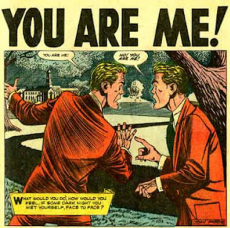
Email: reecejordan98@hotmail.co.uk
Total Article : 168
About Me:18-year-old sixth form student, studying English Literature, History and Government and Politics. My articles will broadly cover topics from the current affairs of politics to reviews of books and albums, as well as adding my own creative pieces, whether it be short fiction or general opinion.

This, whilst also being an example of the uncanny through ‘doubling’ due to how they are the ‘recurrence of the same thing’, is perhaps more so due to the blurred boundary of fantasy and reality. Offred describes these men of ‘some other army’ as something abstract: ‘yet there they were: sudden apparitions, like Martians’ / ‘There was a dreamlike quality to them’. This juxtaposition of real-life event similarities and abstract qualities emphasises the blurred boundary between reality and fantasy, and could be Atwood highlighting the way in which we view regimes of the past, similar to that of Gilead, through a lens of detachment, as if they were fantasy. Atwood has Offred, in Freudian terms, ‘faced with the reality that [she] had until now thought imaginary’. The ‘Historical Notes’, which is set some centuries after, is a lecture given on the ‘text’ or tapes collected. Offred’s personal ‘tale’ is reduced to the Professor’s ‘item’ for his ‘little chat’, which elicits laughter and applause from his audience. Just as Offred was detached from the reality of the initial stages of the Gileadean regime that echoed past events, so too is the Professor and his audience from the severity of Offred’s story. By blurring the boundary between reality and fantasy Atwood could be highlighting that such detachment from the realities of the past make societies ripe for repetition of the same happenings in the future. Freud states that before writing his essay he must first ‘put himself in the proper state of feeling of the uncanny’. Thus, Freud emphasises that the uncanny is a feeling, and it can be argued that Atwood’s novel seeks to tap into such bodily unease that the uncanny induces and serve as a call to change our attitude towards history.
One of the other main facets of the uncanny, according to Freud, is ‘the idea of the “double” (the Doppelganger), in all its nuances and manifestations – that is to say, the appearance of persons who have to be regarded as identical because they look alike’. Atwood herself has stated her preoccupation with the uncanniness of those regarded as ‘identical’: ‘we still find something uncanny about them: perhaps such exact replication suggests to us a denial of our own uniqueness’. The notion of the denial of one’s uniqueness underpins the uncanny doubling within the novel. The Handmaidens must travel in pairs to go shopping and, as her and Ofglen, another Handmaiden, are identically dressed, Offred notes she had, ‘A shape, red with white rings around the face, a shape like mine.’ Later she states, ‘Doubled, I walked the street’, and further on, ‘She’s like my own reflection, in a mirror from which I’m moving away’. This repetition of Offred and Ofglen being identical emphasises the way in which the Gilead regime negates any semblance of identity; both are identical purely because the regime has made them identical. They are both subordinate to the regime. The ridding of identity also comes in their given names. Offred is ‘of Fred’ and Ofglen ‘of Glen’, the respective names of their commanders.
Image Credits: scalar.usc.edu

0 Comment:
Be the first one to comment on this article.